Americano
How Much Milk in Americano
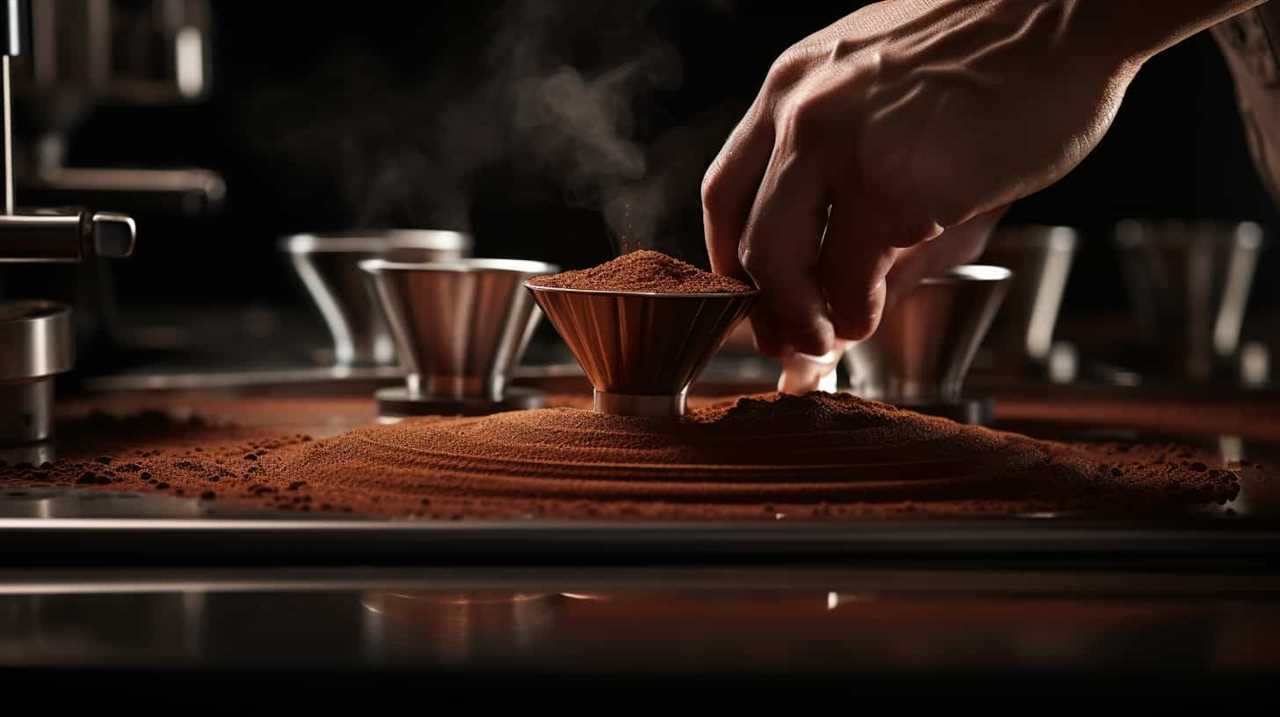
As someone who loves coffee, I am always on the lookout for the ideal blend of flavors in my Americano.
And let me tell you, the amount of milk can make or break that experience.
Today, we dive into the intriguing world of milk ratios in this classic beverage.
From exploring different milk options to adjusting the amount for a creamy delight, we’ll uncover the secrets to achieving the ideal milk-to-espresso harmony.
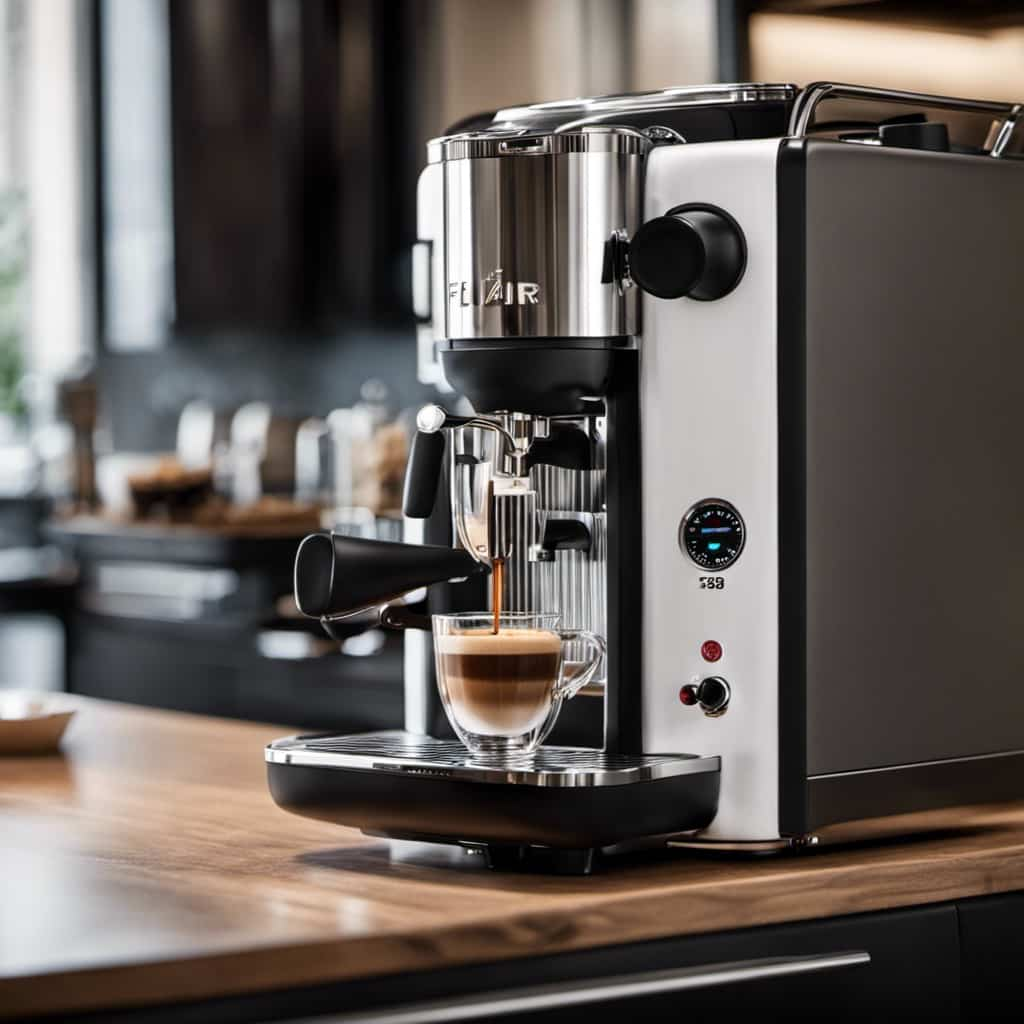
Get ready to elevate your Americano game with innovative milk techniques.
Let’s dive in!
Key Takeaways
- The ideal milk ratio in an Americano is subjective and depends on personal preference.
- Experimentation is key to finding the perfect milk ratio.
- Different milk options such as whole milk, almond milk, oat milk, skim milk, soy or coconut milk can be used in an Americano.
- Recommended amounts of milk for different options range from 1-2 tablespoons for whole milk to 3-4 tablespoons for almond or oat milk.
The Traditional Americano: Milk Ratio
As a coffee enthusiast, I always wonder about the milk ratio in a traditional Americano. The history of the Americano dates back to World War II, where American soldiers stationed in Italy found the espresso too strong for their taste. To dilute the intensity, they added hot water, creating a milder version of the espresso.
However, the addition of milk became a popular variation, providing a creamy and smooth texture to the drink. The impact of milk on the flavor of an Americano is significant. It adds a subtle sweetness and richness, balancing out the bitterness of the espresso. The milk also helps to mellow the acidity, enhancing the overall taste profile.

The ideal milk ratio in an Americano is subjective, as it depends on personal preference. Some may prefer a splash of milk for a lighter taste, while others may opt for a larger amount to create a latte-like experience. Experimentation is key to finding the perfect milk ratio that suits your palate.
Exploring Different Milk Options for Americano
My personal favorite milk option for Americano is whole milk. However, if you’re looking to explore different milk alternatives for your Americano, there are several options to consider.
One popular choice is almond milk, which adds a subtle nutty flavor to your drink.
Another option is oat milk, known for its creamy texture and slightly sweet taste.

For those who prefer a lighter option, skim milk can still provide a creamy texture without the added fat.
If you’re feeling adventurous, you can even try frothed milk options like soy or coconut milk, which can add a unique twist to your Americano.
Now that we’ve explored the different milk options, let’s dive into how much milk to add for a creamy Americano.
How Much Milk to Add for a Creamy Americano
When making a creamy Americano, I usually add a splash of milk just before serving. The amount of milk you add to your Americano depends on personal preference. Some people prefer just a hint of creaminess, while others like a more substantial amount of milk. To help you find the perfect balance, here is a table showing different milk options and the recommended amount to add for a rich and creamy Americano:
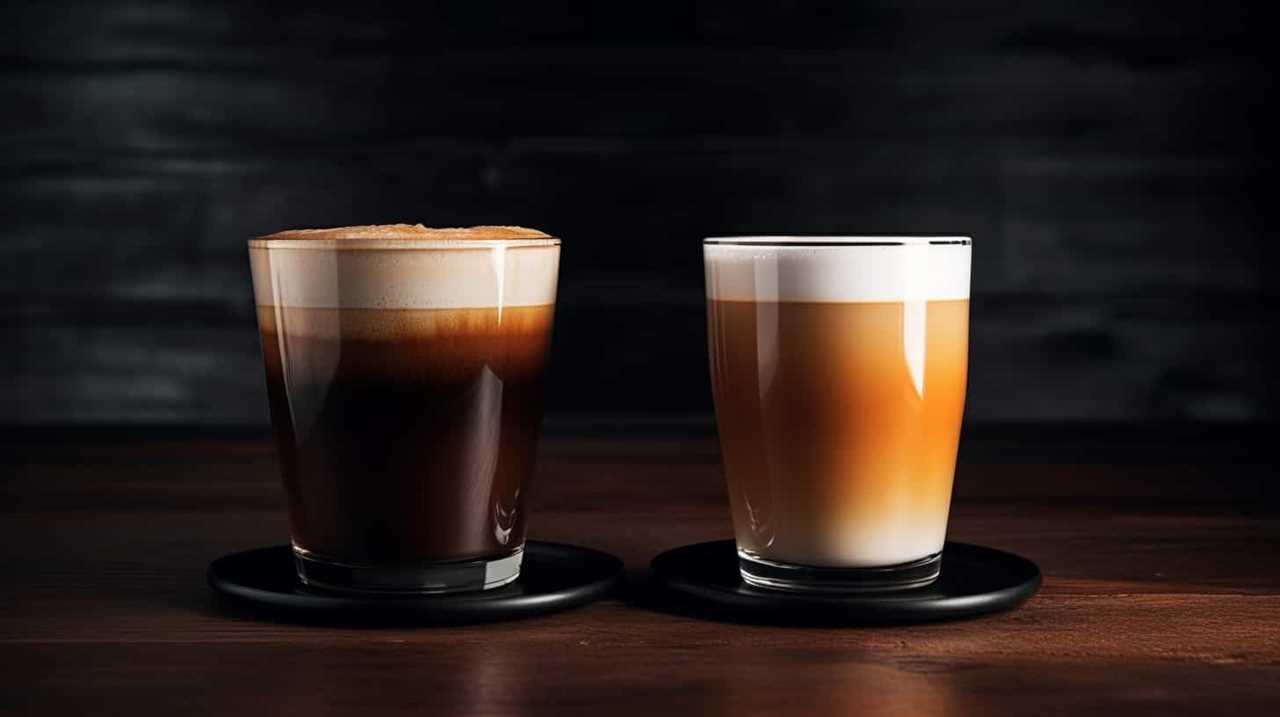
| Milk Option | Recommended Amount |
|---|---|
| Whole Milk | 1-2 tablespoons |
| 2% Milk | 2-3 tablespoons |
| Almond Milk | 3-4 tablespoons |
| Oat Milk | 3-4 tablespoons |
| Coconut Milk | 2-3 tablespoons |
Feel free to experiment with different milk options to find your favorite. Alternative milks can add unique flavors and textures to your Americano, allowing you to create a truly innovative and personalized coffee experience. So go ahead and explore the world of milk options to elevate your creamy Americano to the next level.
Achieving the Perfect Milk-to-Espresso Balance in an Americano
To achieve the perfect milk-to-espresso balance in my Americano, I start by adding a small amount of milk and gradually adjust to my desired taste. Understanding the role of milk in an Americano is essential for achieving the perfect espresso strength.
Milk adds creaminess and smoothness to the Americano, enhancing its overall flavor profile. However, it’s important not to overpower the espresso with too much milk. I find that starting with a ratio of 1:4 – one part milk to four parts espresso – is a good starting point. From there, I can adjust the amount of milk based on my personal preference.
Adding too much milk can dilute the espresso and weaken its strength, while adding too little may result in a strong and bitter taste. By experimenting and finding the right balance, I can achieve the perfect milk-to-espresso ratio in my Americano, ensuring a delightful and well-rounded coffee experience.
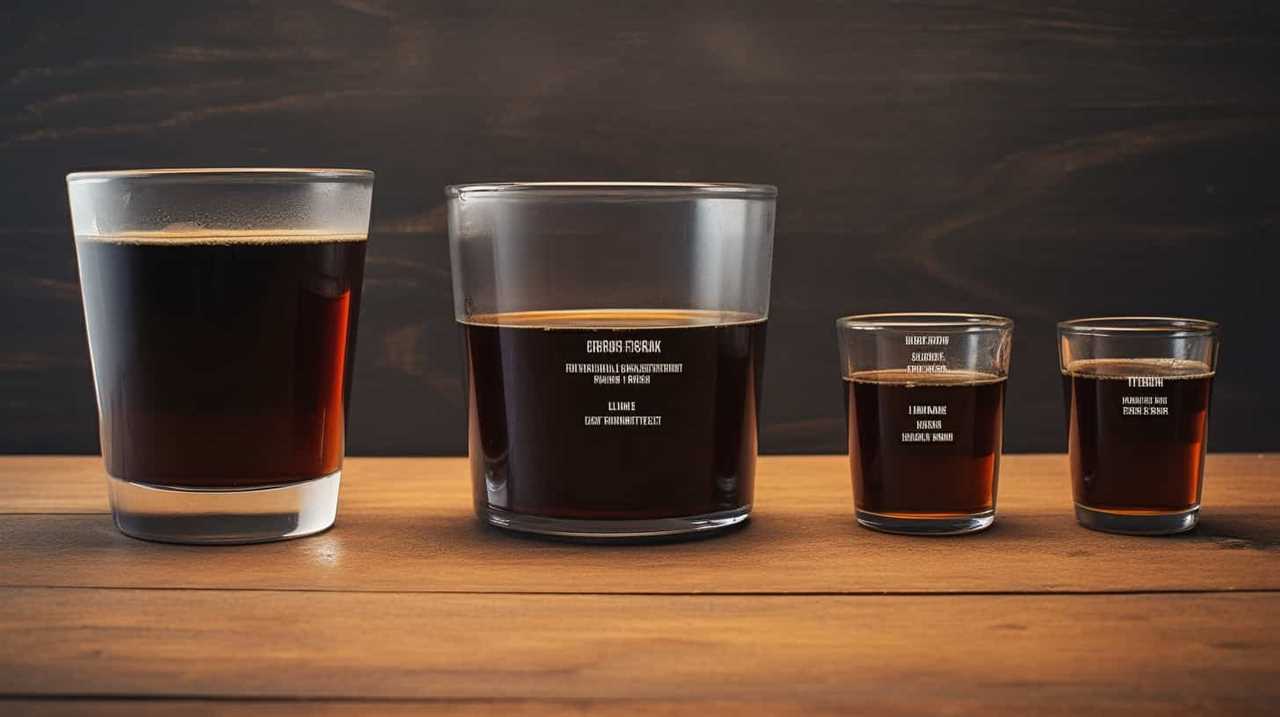
Adjusting the Milk Amount for Personal Preference in an Americano
Finding the right milk amount for my personal preference in an Americano is crucial for achieving the perfect balance of flavors. Here are some tips for adjusting the milk amount to suit your taste:
-
Experiment with different ratios: Start by adding a small amount of milk and gradually increase until you find the desired level of creaminess.
-
Consider milk temperature: Adjusting the milk temperature can greatly impact the taste of your Americano. Try steaming the milk to different temperatures to find the one that complements the espresso best.
-
Try alternative milk options: If you prefer a dairy-free option or want to explore new flavors, consider using alternative milk options such as almond, oat, or coconut milk.

-
Take into account the strength of the espresso: The strength of the espresso can affect how much milk you need. Adjust the milk amount accordingly to maintain the desired coffee-to-milk balance.
-
Personalize it: Ultimately, the perfect milk amount in an Americano is subjective. Don’t be afraid to experiment and adjust to your own personal preference. Innovation lies in finding what works best for you.
Frequently Asked Questions
Can I Use Non-Dairy Milk Alternatives in My Americano?
Yes, you can use non-dairy milk alternatives in your americano. Plant-based milk options like almond, soy, or oat milk can be used as alternatives to dairy milk, providing a unique and innovative twist to your coffee.
What Is the Best Type of Milk to Use for a Rich and Creamy Americano?
The best milk alternatives for a rich and creamy americano are oat milk and almond milk. They add a velvety texture and a subtle nutty flavor. Adding milk enhances the taste and adds a touch of sweetness to your coffee.

How Does the Milk-To-Espresso Ratio Affect the Taste of an Americano?
The milk-to-espresso ratio in an Americano can greatly impact its taste. Experimenting with different ratios can lead to a creamier, richer, or stronger flavor. Milk alternatives like almond or oat milk can also add unique flavors to the drink.
Is It Possible to Achieve a Frothy Texture With the Milk in an Americano?
Achieving a frothy texture with the milk in an americano is possible. There are frothy milk alternatives available, such as oat or almond milk, that can be used. Here are some tips for achieving a velvety texture:
Are There Any Health Benefits or Drawbacks to Adding Milk to an Americano?
Adding a splash of milk to an Americano can provide some health benefits like added calcium and vitamins. However, potential drawbacks include increased calorie and fat intake. It’s important to find a balance that suits your dietary needs.
Conclusion
In conclusion, finding the perfect milk-to-espresso balance in an Americano is like creating a masterpiece. It requires precision, experimentation, and a touch of artistry.

By exploring different milk options and adjusting the amount to personal preference, one can achieve a creamy and delightful Americano experience.
So go ahead, unleash your inner barista and create your own caffeinated masterpiece with the perfect amount of milk!
In the vast and diverse world of coffee, coffee alternatives, and tea, Olivia has found her calling. As an author and a dedicated coffee and tea aficionado, her work for Cappuccino Oracle reflects her profound love and understanding of the intricate complexities found within these beverages. Olivia’s passion for the subject serves as both a catalyst for her creativity and a connection point with her audience.
Olivia’s appreciation for coffee, coffee alternatives, and tea blossomed at an early age. She discovered that these beverages invigorated her senses and stimulated her creative spirit. From the nuanced flavors of single-origin roasts to the captivating narratives intertwined with coffee, coffee alternatives, and tea trade and culture, Olivia found an unlimited source of inspiration in her daily cup.
Her love for these beverages and her talent for storytelling eventually converged at Cappuccino Oracle. As an author, Olivia’s mission is to illuminate the intricate tapestry that makes up the world of coffee, coffee alternatives, and tea. Her articles span a diverse range of topics, encompassing everything from the unique flavors of different brews to the sociocultural history intertwined with their cultivation and consumption.
Americano
Your Ideal Companion: The Water-Coffee Balance for Perfect Brews
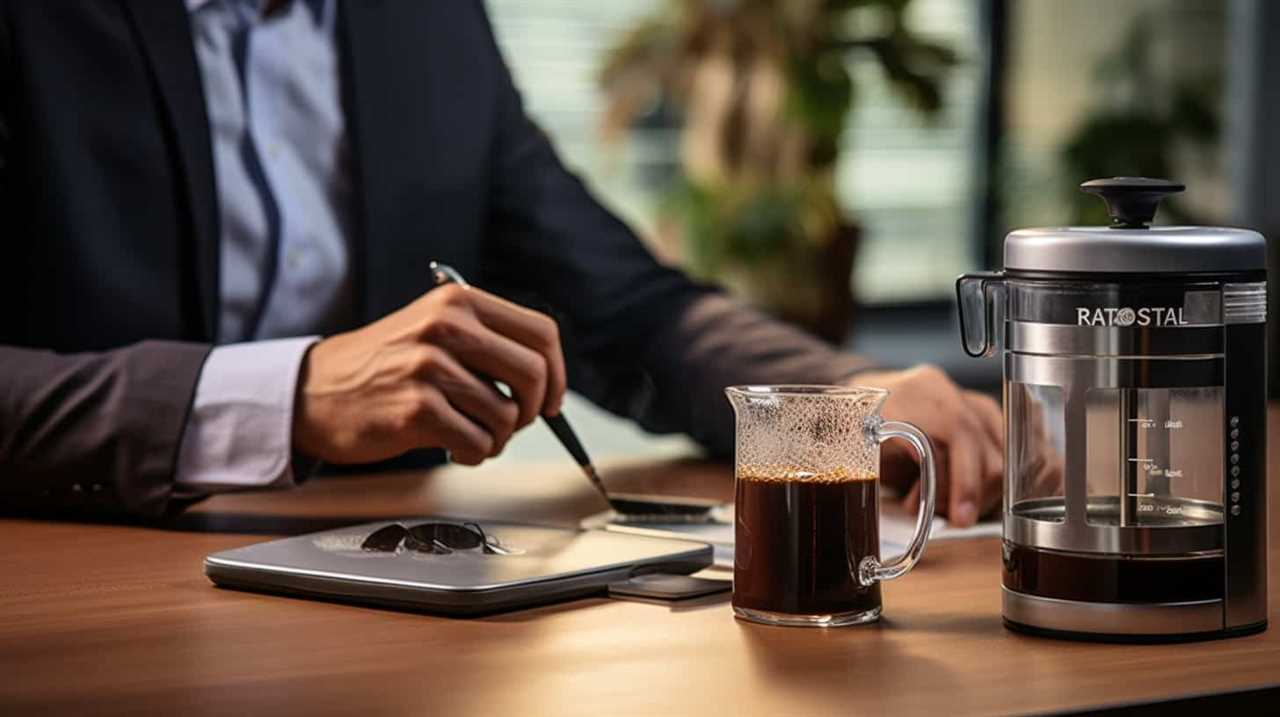
Are you in need of the perfect partner to enhance your coffee brewing journey? Search no more, find the ideal balance between water and coffee.
In this article, we will delve into the science behind the water-coffee interaction, uncovering the secrets to achieving the ideal water-to-coffee ratio for that perfect Americano.
Join us as we explore different ratios, adjust to suit your taste preferences, and master the art of the water-coffee balance. Get ready to serve up exceptional brews like a pro!
Key Takeaways
- Careful measurement and adjustment of the water-coffee ratio is crucial for brewing the perfect Americano.
- The recommended water temperature for brewing an Americano is approximately 195-205 degrees Fahrenheit.
- Finding the right balance of temperature is essential for optimal extraction and flavor.
- The water-to-coffee ratio impacts the brew strength and flavor profile.
The Importance of Water-Coffee Ratio in Brewing the Perfect Americano
We need to carefully measure and adjust the water-coffee ratio to ensure we brew the perfect Americano. The water temperature and coffee extraction are key factors that contribute to achieving this ideal balance.

When brewing an Americano, it’s crucial to use water that’s heated to approximately 195-205 degrees Fahrenheit. This temperature range allows for optimal extraction of the coffee’s flavors and aromas.
In terms of the ratio, a common guideline is to use 1 part coffee to 15 parts water. However, personal preference may vary, so it’s important to experiment and adjust accordingly.
Understanding the Science Behind Water and Coffee Interaction
Let’s now delve into the science behind the interaction between water and coffee.
Understanding the chemistry of coffee brewing is essential to achieving the perfect cup. One key aspect is the water-to-coffee ratio, which determines the extraction of flavors and compounds from the coffee grounds.

Coffee Brewing Chemistry
Understanding the chemistry behind the interaction of water and coffee is crucial for achieving the perfect brew. When it comes to coffee brewing, extraction is a term that refers to the process of dissolving soluble compounds from the coffee grounds into the water. This extraction process is influenced by several factors, and one of the most important is temperature.
The temperature of the water affects the rate at which compounds are extracted from the coffee, as well as the overall flavor profile of the brew. Higher temperatures tend to result in faster extraction, but they can also lead to over-extraction and a bitter taste. On the other hand, lower temperatures can result in under-extraction and a weak, sour taste.
Finding the right balance of temperature is essential for achieving the optimal extraction and flavor in your coffee.
Water-To-Coffee Ratio
To achieve the perfect brew, it’s important to understand the science behind the interaction of water and coffee through the water-to-coffee ratio. Here are some key points to consider:

-
Impact of temperature: The temperature of the water affects the extraction process. Hotter water extracts more flavor compounds from the coffee grounds, but if the water is too hot, it can lead to over-extraction and bitterness. Finding the right temperature is crucial for achieving balance.
-
Role of extraction time: The duration of the brewing process also plays a significant role. Longer extraction times can result in a stronger, more intense flavor, while shorter times may lead to a weaker brew. It’s essential to find the optimal extraction time based on personal taste preferences.
-
Finding the perfect balance: Experimenting with different water-to-coffee ratios, temperatures, and extraction times is key to finding the ideal balance. It’s a delicate dance between the intensity of flavor and the desired strength of the brew.
-
Personalization: Adjusting the water-to-coffee ratio allows you to tailor the brew to your preference. Some may prefer a stronger cup, while others may opt for a milder taste.
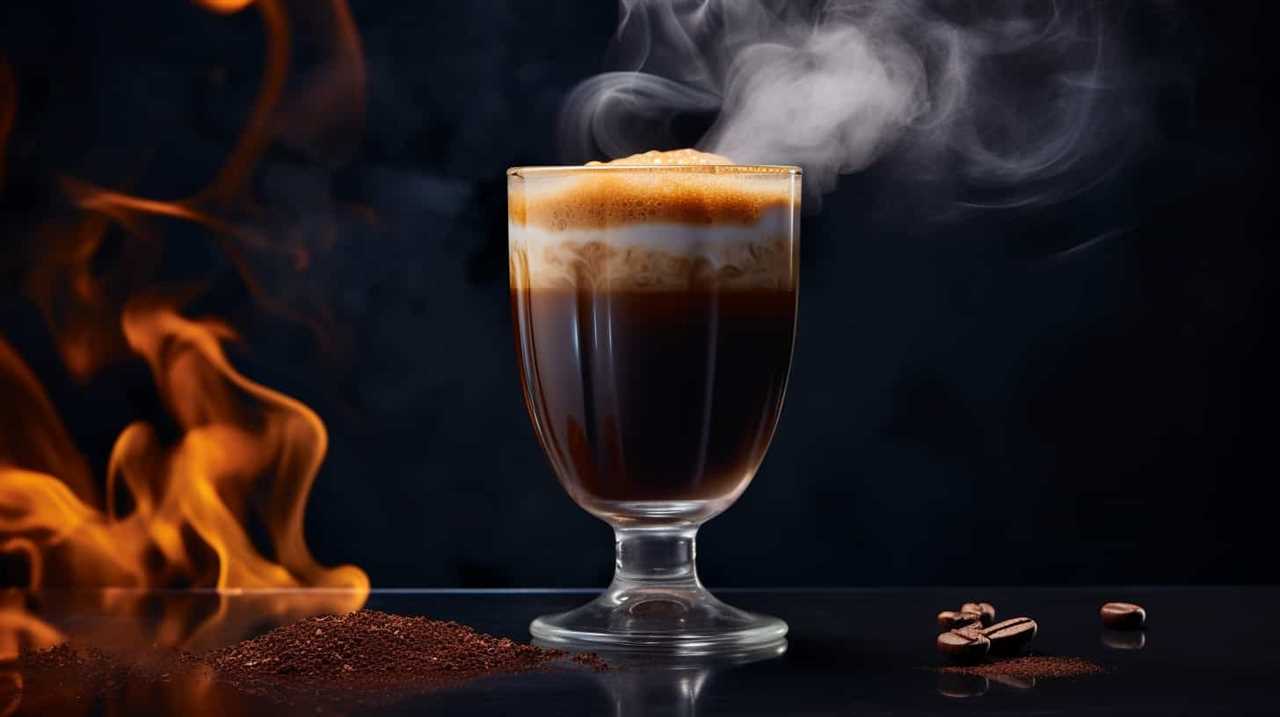
-
Consistency is key: Once you’ve found your perfect water-to-coffee ratio, maintaining consistency in each brew ensures that you can enjoy the same delightful cup of coffee every time.
Finding the Right Balance: Determining the Ideal Water-to-Coffee Ratio
When it comes to brewing the perfect cup of coffee, finding the right water-to-coffee ratio is crucial. The optimal brew strength can vary depending on personal taste preferences, but experimenting with different ratios is key to achieving the ideal balance.
Optimal Brew Strength
We can achieve the optimal brew strength by carefully determining the ideal water-to-coffee ratio. Here are five factors to consider when finding the right balance for your perfect brew:
-
Brewing techniques: Different brewing methods require different water-to-coffee ratios. For example, a French press typically uses a higher coffee-to-water ratio compared to a pour-over method.
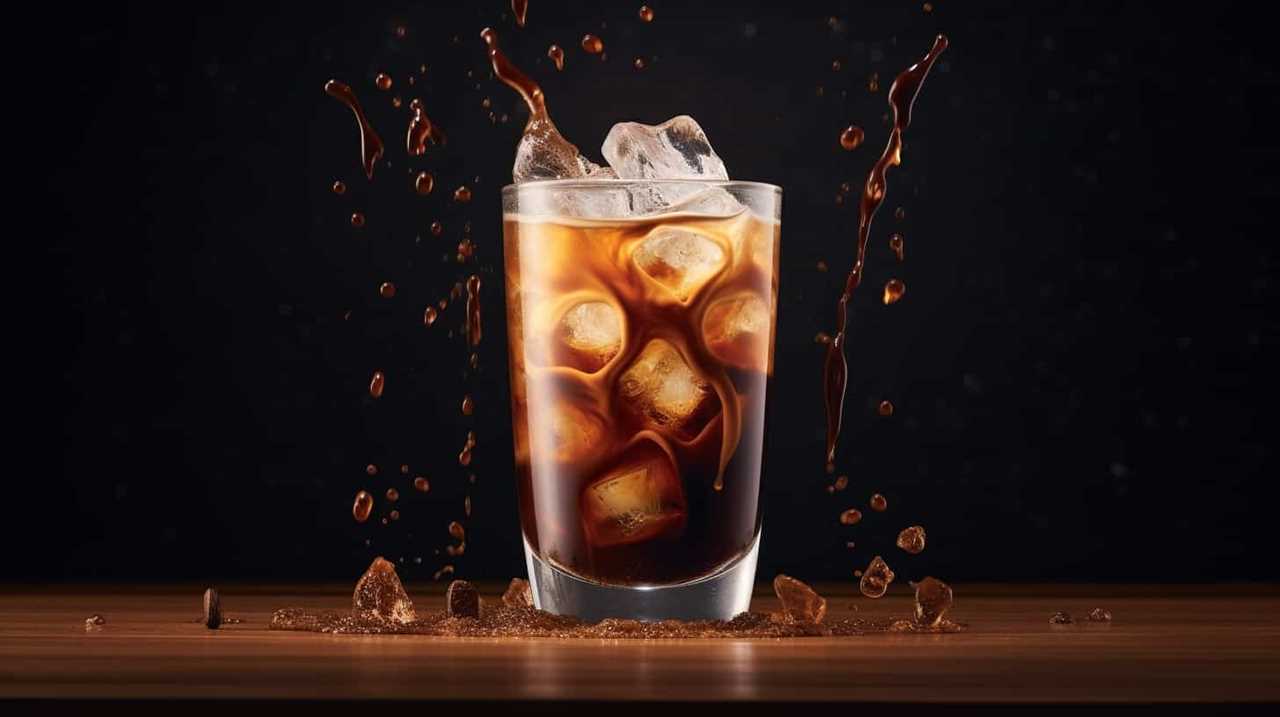
-
Coffee origin and roast level: The origin and roast level of your coffee beans can affect the ideal water-to-coffee ratio. Lighter roasts may require more water to extract flavors fully, while darker roasts may need less.
-
Desired flavor extraction: Adjusting the water-to-coffee ratio can impact the flavor profile of your brew. Increasing the coffee ratio can result in a stronger, more intense flavor, while decreasing it can yield a milder taste.
-
Grind size: The size of your coffee grounds can influence the water-to-coffee ratio. Finer grounds extract more quickly, so you may need less coffee compared to coarser grounds.
-
Personal preference: Ultimately, your taste preferences should guide the water-to-coffee ratio. Experiment with different ratios to find the brew strength that suits your palate.

Experimenting With Ratios
Let’s experiment with different ratios to determine the ideal water-to-coffee balance for the perfect brew.
When finding the right balance, it’s important to consider water temperature and brewing time. The water temperature affects the extraction process, so it’s crucial to get it just right. For most coffee beans, a water temperature between 195°F and 205°F (90°C to 96°C) is recommended. This range allows for optimal extraction of flavors without scorching the coffee grounds.
Next, brewing time plays a significant role in achieving the perfect balance. Generally, a brewing time of 4 to 6 minutes is recommended for a well-balanced cup of coffee. However, keep in mind that different brewing methods may require slight adjustments in brewing time.
Exploring Different Water and Coffee Ratios for Americano
To achieve the perfect Americano, we need to experiment with various ratios of water and coffee. Finding the right balance is crucial for achieving the optimal flavor and strength.
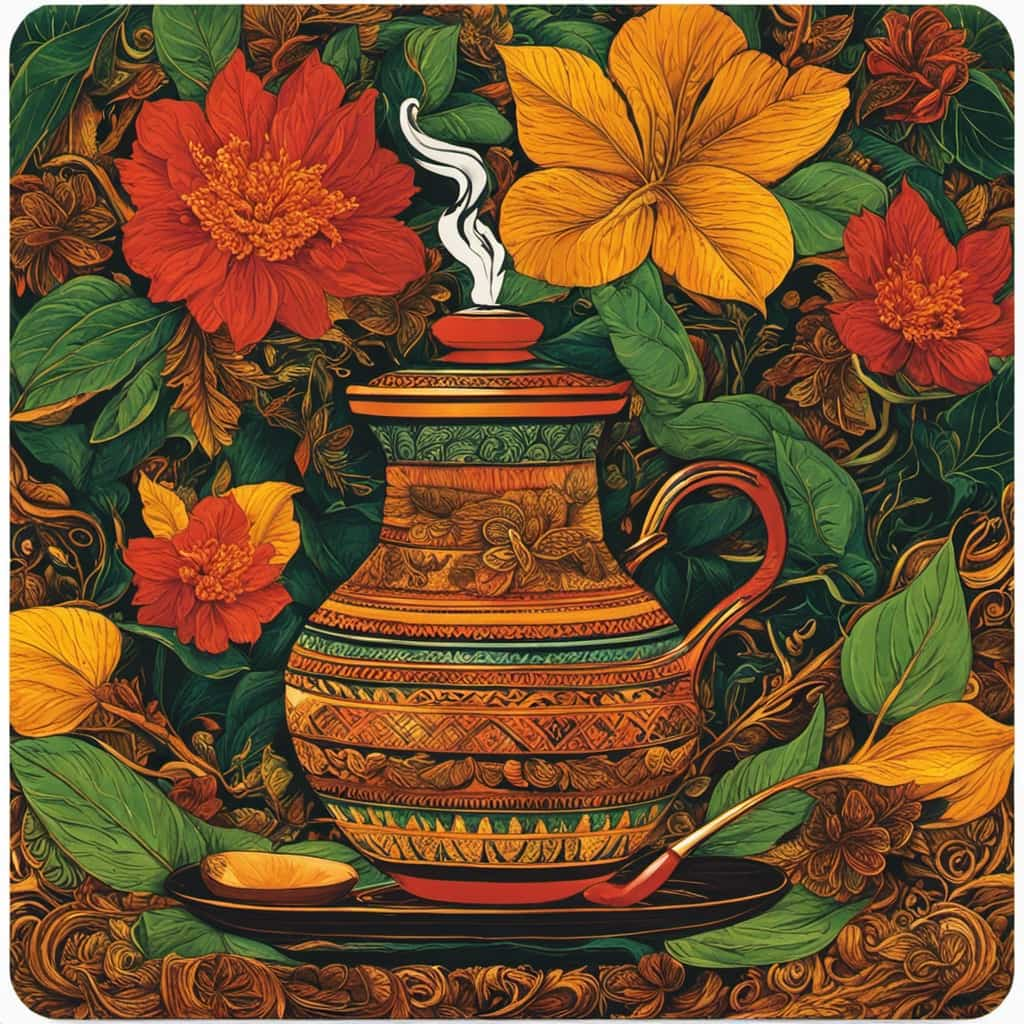
Here are five factors to consider when exploring different water and coffee ratios:
-
Water temperature: Adjusting the water temperature can have a significant impact on the taste of your Americano. Experiment with different temperatures to find the sweet spot that brings out the flavors of the coffee without making it too bitter or acidic.
-
Extraction time: The length of time you allow the water to come into contact with the coffee grounds affects the strength and intensity of the brew. Try different extraction times to find your preferred balance.
-
Coffee-to-water ratio: Playing around with the amount of coffee and water used will allow you to customize the strength and flavor of your Americano to your liking.

-
Grind size: The size of the coffee grounds can influence the extraction process. Experimenting with different grind sizes can help you achieve the desired taste and body in your Americano.
-
Brewing method: Different brewing methods, such as pour-over or French press, can yield varying results. Try different techniques to find the one that produces the best Americano for you.
Adjusting the Water-Coffee Ratio to Suit Your Taste Preferences
When it comes to brewing the perfect cup of coffee, finding the right water-coffee ratio is key. Each person’s taste preferences vary, so it’s important to experiment with different ratios to find your sweet spot.
Adjusting the water-coffee ratio allows you to customize the strength and flavor of your brew, ensuring that every cup is tailored to your liking.
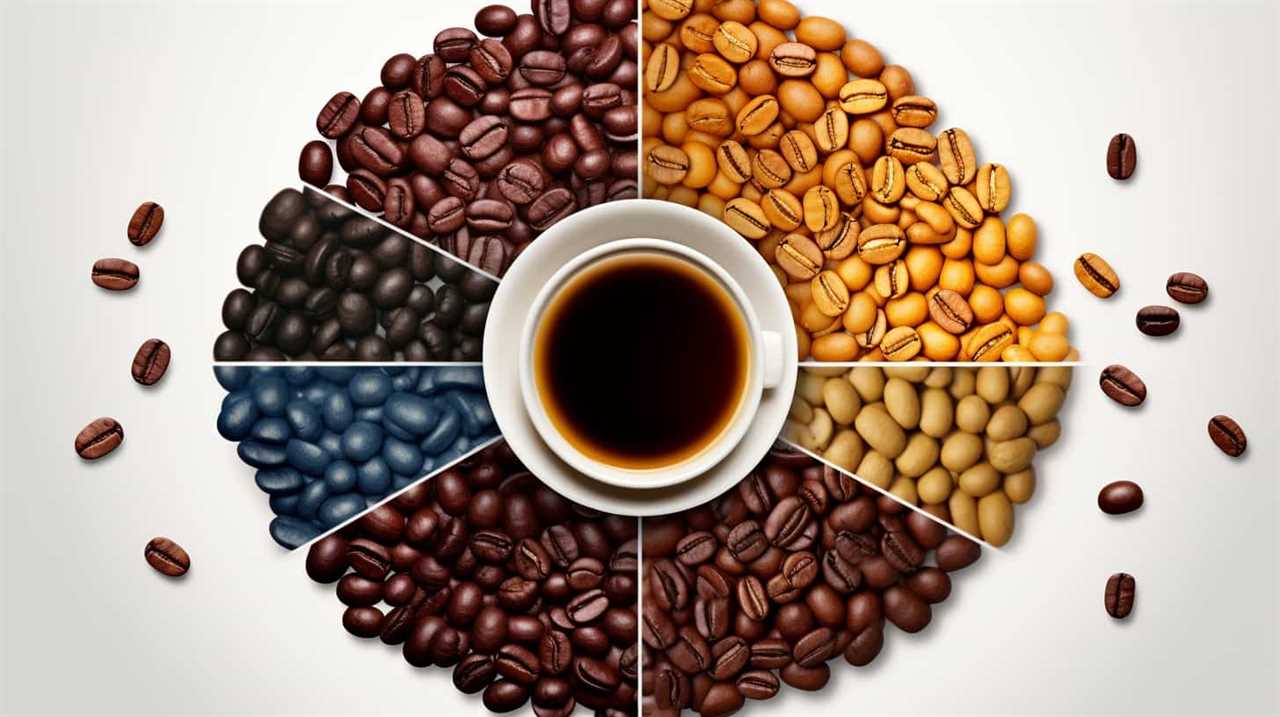
Finding Your Sweet Spot
We recommend experimenting with different water-coffee ratios to discover your preferred taste profile. Finding your sweet spot involves adjusting the water-coffee ratio, brew time, and grind size to achieve the perfect balance. Here are some tips to help you on your journey:
- Start with a 1:15 water-coffee ratio and adjust from there.
- Increase or decrease the brew time to control the strength of your coffee.
- Experiment with different grind sizes to find the optimal extraction.
- Keep a brewing journal to track your preferences and make adjustments accordingly.
- Don’t be afraid to try new methods and techniques to enhance your brewing experience.
By finding the right water-coffee ratio, adjusting the brew time, and fine-tuning the grind size, you can unlock a world of flavors and create your ideal cup of coffee.
Happy brewing!
Experimenting With Ratios
By adjusting the water-coffee ratio, we can fine-tune our taste preferences and create a perfect brew. The water temperature and extraction time are crucial factors in achieving the desired flavor profile.
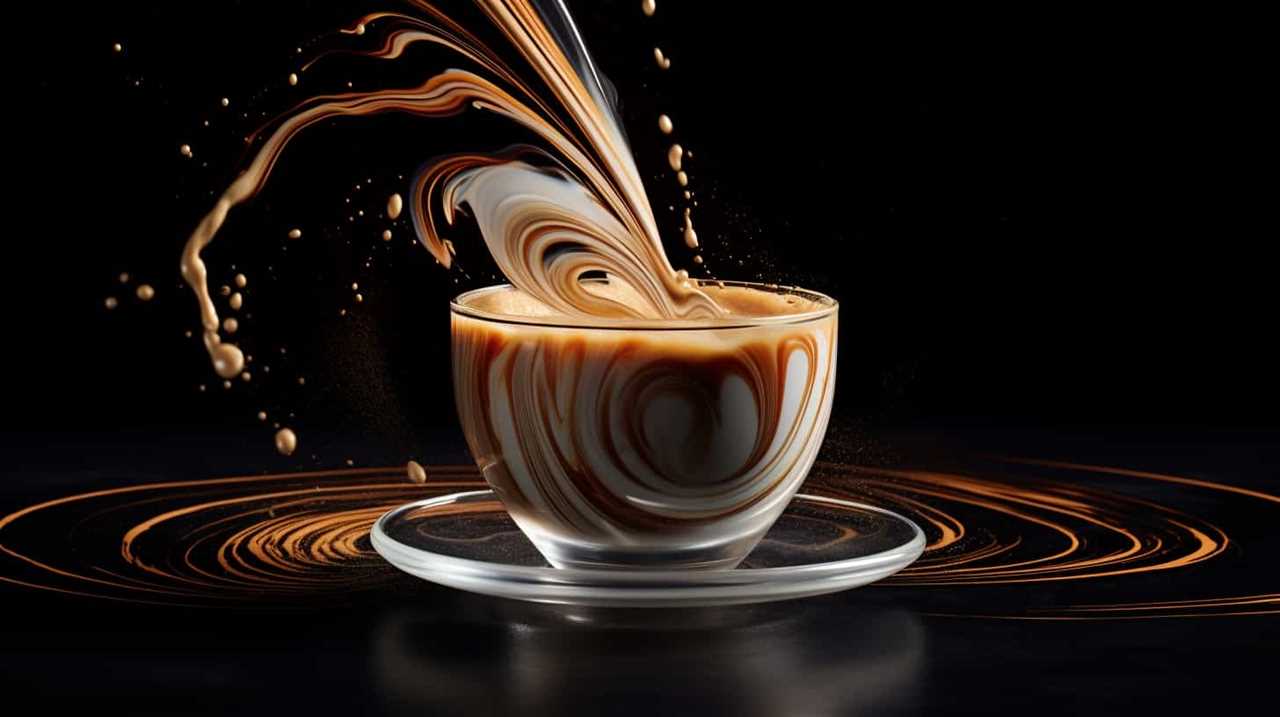
A higher water temperature, around 195-205°F (90-96°C), allows for better extraction of coffee solubles, resulting in a fuller-bodied and more flavorful cup. On the other hand, a lower water temperature can bring out more delicate and nuanced flavors.
Experimenting with different ratios and water temperatures will help us discover our preferred taste combinations. Additionally, extraction time plays a significant role in the final result.
Shorter extraction times, around 2-3 minutes, tend to yield a brighter and more acidic cup, while longer extraction times, around 4-5 minutes, produce a bolder and more robust flavor.
Tips for Achieving Consistency in Water and Coffee Measurements
To achieve consistent results in our brews, we must pay attention to the measurements of both water and coffee. Here are some tips to help you achieve that perfect balance:

-
Use a reliable measuring tool: Invest in a good coffee scale to accurately measure your coffee grounds and a kettle with a built-in thermometer to monitor water temperature.
-
Maintain water temperature: For most coffee brewing methods, water temperature should be between 195-205°F (90-96°C). Too hot or too cold will affect the extraction and taste of your coffee.
-
Follow the coffee-to-water ratio: As a general rule, a ratio of 1:16 (1 gram of coffee to 16 grams of water) is a good starting point. Adjust according to your taste preferences.
-
Consistency is key: Use the same measuring tools and follow the same ratio every time to ensure consistent results.

-
Experiment and adjust: Don’t be afraid to tweak the ratio and water temperature to find your perfect brew.
The Effects of Water Quality on the Taste of Your Americano
When considering the taste of our Americano, it’s important to understand the effects of water quality. The quality of water used in brewing can greatly impact the flavor of our coffee.
One crucial factor to consider is water temperature. Water that’s too hot can result in a bitter and over-extracted taste, while water that’s too cold can lead to an under-extracted and weak flavor. Finding the right water temperature, usually between 195°F and 205°F (90°C and 96°C), can help us achieve the perfect balance.
Another important aspect is the impact of mineral content in water. Minerals such as calcium and magnesium can enhance the aroma and flavor of our Americano, while excessive minerals or impurities can cause off-flavors.

Understanding the role of water quality is essential in serving a delicious cup of Americano to our customers.
The Role of Grind Size in Achieving the Perfect Water-Coffee Balance
Finding the ideal grind size is crucial in achieving the perfect water-coffee balance for our brews. The grind size impact on the extraction process can’t be overstated. Here are five key points to consider when it comes to grind size:
- Finer grind allows for more surface area, resulting in faster extraction.
- Coarser grind slows down extraction, allowing for more control over the brewing process.
- The right grind size ensures optimal extraction of flavors, aromas, and oils from the coffee beans.
- Consistency in grind size leads to even extraction and a balanced cup of coffee.
- Different brewing methods require different grind sizes for the best results.
Understanding the impact of grind size is essential for achieving optimal extraction and a well-balanced cup of coffee. With this knowledge, we can now move on to the next step: experimenting with brewing methods to enhance the water-coffee ratio.
Experimenting With Brewing Methods to Enhance the Water-Coffee Ratio
We can explore three different brewing methods to enhance the water-coffee ratio and achieve the perfect brew.

The first method involves adjusting the water temperature. Different coffee beans require different water temperatures for optimal extraction. Generally, a temperature between 195-205°F (90-96°C) is recommended, as this range helps to extract the flavors without resulting in bitterness.
The second method involves controlling the extraction time. The longer the coffee grounds are in contact with the water, the more flavor compounds are extracted. However, too long of an extraction time can lead to over-extraction and a bitter taste. It’s important to find the right balance and experiment with different brewing times to achieve the desired flavor profile.
Lastly, the third method involves using different brewing devices such as a French press, pour-over, or espresso machine. Each device has its own unique water-coffee ratio requirements, which can affect the flavor and strength of the brew.
Troubleshooting Common Issues With Water and Coffee Measurements
Have we encountered any common issues with water and coffee measurements that we need to troubleshoot? Absolutely. Here are some troubleshooting tips to help you overcome measurement issues and adjust your brewing techniques for the perfect cup of coffee:

-
Uneven extraction: If your coffee tastes bitter or sour, it could be due to inconsistent water and coffee measurements. Try using a digital scale to ensure accurate ratios.
-
Weak or watery coffee: If your brew lacks flavor and intensity, you might be using too much water or too little coffee. Adjust the measurements accordingly to achieve a stronger brew.
-
Over-extracted coffee: If your coffee tastes excessively bitter, it might be a result of using too much coffee or brewing for too long. Decrease the coffee-to-water ratio or shorten the brewing time.
-
Inconsistent results: If your coffee tastes different every time, it could be due to inconsistent measurements. Be precise and consistent with your water and coffee ratios to achieve reliable results.

-
Wasted coffee: If you consistently end up with leftover coffee, you might need to adjust your measurements to avoid making more than you need.
Mastering the Art of the Water-Coffee Balance: Tips From the Pros
To achieve the ideal water-coffee balance, we recommend using a precise ratio of one tablespoon of coffee grounds to every six ounces of water. However, mastering the art of the water-coffee balance involves more than just the correct measurements. Paying attention to water temperature and brew time can greatly impact the flavor of your brew. When it comes to water temperature, it is best to use water that is between 195 to 205 degrees Fahrenheit. This range ensures proper extraction of flavors from the coffee grounds. Additionally, brew time also plays a crucial role. Generally, a brew time of 4 to 5 minutes is recommended for a well-balanced cup of coffee. However, if you prefer a stronger brew, you can extend the brew time slightly. Remember, finding the perfect water-coffee balance is a journey of experimentation and personal preference.
| Water Temperature | Impact of Brew Time |
|---|---|
| 195-205°F | Proper extraction |
| 4-5 minutes | Well-balanced cup |
Frequently Asked Questions
Can I Use Tap Water for Brewing an Americano?
We can use tap water for brewing an americano, but using filtered water will result in a better tasting cup. The water temperature also affects the flavor, so it’s important to use hot water to extract the best flavors from the coffee.
Why Is the Water-To-Coffee Ratio Important in Brewing the Perfect Americano?
The water-to-coffee ratio is crucial for a perfect americano because it determines the strength and flavor. Too little coffee leaves it weak, while too much makes it bitter. It’s all about finding the right balance based on personal preference.

How Can I Adjust the Water-To-Coffee Ratio to Suit My Taste Preferences?
We can adjust the water-to-coffee ratio to suit our taste preferences by experimenting with different ratios. This allows us to fine-tune the brew strength and find the perfect balance for our ideal cup of coffee.
Does the Grind Size of Coffee Beans Affect the Water-Coffee Balance?
Yes, the grind size of coffee beans does affect the water-coffee balance. The grind size impacts the surface area of the coffee, which in turn affects the rate of coffee extraction.
What Are Some Common Issues I May Encounter With Water and Coffee Measurements, and How Can I Troubleshoot Them?
When troubleshooting water and coffee measurements, we may encounter common issues like over-extraction or under-extraction. To adjust brewing techniques, try adjusting the grind size, water temperature, or brew time for a better balance.
Conclusion
In conclusion, achieving the perfect water-coffee balance is essential for brewing the perfect Americano.

By understanding the science behind water and coffee interaction and experimenting with different ratios and brewing methods, you can tailor your brew to suit your taste preferences.
While some may argue that finding the ideal balance can be challenging, with practice and the tips from the pros, mastering this art is within reach for every coffee lover.
Justin is a seasoned author, coffee and tea enthusiast, and an essential member of the Cappuccino Oracle team. With a keen appreciation for the complexities of coffee, coffee alternatives, and tea, Justin has dedicated his professional career to exploring these realms and sharing his insights with readers worldwide.
Justin’s immersion in the world of coffee, coffee alternatives, and tea began at a young age, kindling a passion that extended beyond mere consumption. This love for these beverages led him to combine his talent for writing with his devotion to coffee and tea, bringing him to Cappuccino Oracle as a dedicated author.
Americano
Can You Name These Top Gourmet Specialty Coffees?

Did you realize that there are numerous gourmet specialty coffees to excite your taste buds? We challenge you to name them all!
In this article, we’ll take you on a journey through the top gourmet coffees from around the world. From the famous Blue Mountain Coffee to the exotic Ethiopian Yirgacheffe Coffee, we’ll explore the unique flavors and origins of these delicious brews.
So sit back, grab a cup of your favorite coffee, and let’s dive into the world of gourmet specialty coffees together.
Key Takeaways
- Jamaican coffees, particularly Blue Mountain Coffee, are renowned for their unique flavor profiles and are grown in the Blue Mountains of Jamaica.
- Specialty coffees from other regions such as Kona Coffee from Hawaii, Ethiopian Yirgacheffe Coffee, and Guatemalan Antigua Coffee also offer distinct flavor profiles based on their unique growing conditions and brewing methods.
- The pour-over and French press brewing methods bring out different characteristics in specialty coffees, allowing flavors to fully develop and showcase their unique qualities.
- There are popular Ethiopian roasters like Harrar Coffee, Metad Coffee, Yirgacheffe Coffee Farmers Cooperative Union, and Ethiopia Guji Coffee, known for their dedication to producing exceptional coffee and supporting local communities.
Blue Mountain Coffee
We’ve heard so much about Blue Mountain Coffee and we can’t wait to try it.

Blue Mountain Coffee is renowned for its unique flavor profiles that set it apart from other coffees. Grown in the Blue Mountains of Jamaica, this coffee is known for its exceptional quality and distinct taste. The high altitudes, rich volcanic soil, and cool climate of the Blue Mountains create the perfect conditions for cultivating coffee beans with unparalleled flavors.
The coffee has a smooth and well-balanced taste, with hints of chocolate, nutmeg, and floral undertones. Its mild acidity and medium body make it a delightful choice for those who prefer a mellow yet flavorful cup of coffee.
Blue Mountain Coffee truly offers a sensory experience that’s worth savoring.
Kona Coffee
Let’s explore the unique characteristics and flavors of Kona Coffee, grown in the volcanic soil of Hawaii’s Kona region.

-
Kona coffee production: Kona Coffee is cultivated on the slopes of the Mauna Loa volcano, where the rich volcanic soil and perfect climate create ideal growing conditions for this exquisite bean.
-
Kona coffee tasting notes: This gourmet coffee boasts a smooth, medium-bodied flavor with hints of chocolate, caramel, and nuttiness. Its aroma is fragrant and enticing, with floral and fruity undertones.
-
Handpicked and sun-dried: The coffee cherries are carefully handpicked at the peak of ripeness to ensure the highest quality. After harvesting, the beans are sun-dried to enhance their natural flavors.
-
Small-batch roasting: Kona Coffee is typically roasted in small batches to preserve its delicate flavors and aromas, resulting in a perfectly balanced and satisfying cup of coffee.

As we move on to discussing Jamaican coffee, prepare to discover another world of exceptional flavors and characteristics.
Jamaican Coffee
Jamaican coffee is renowned for its exceptional quality, with the most famous variety being Jamaican Blue Mountain.
This coffee is known for its unique flavor profile, characterized by a delicate balance of acidity, sweetness, and smoothness.
The beans are grown in the Blue Mountains of Jamaica, where the high altitude, rich soil, and cool climate contribute to the coffee’s distinct taste.
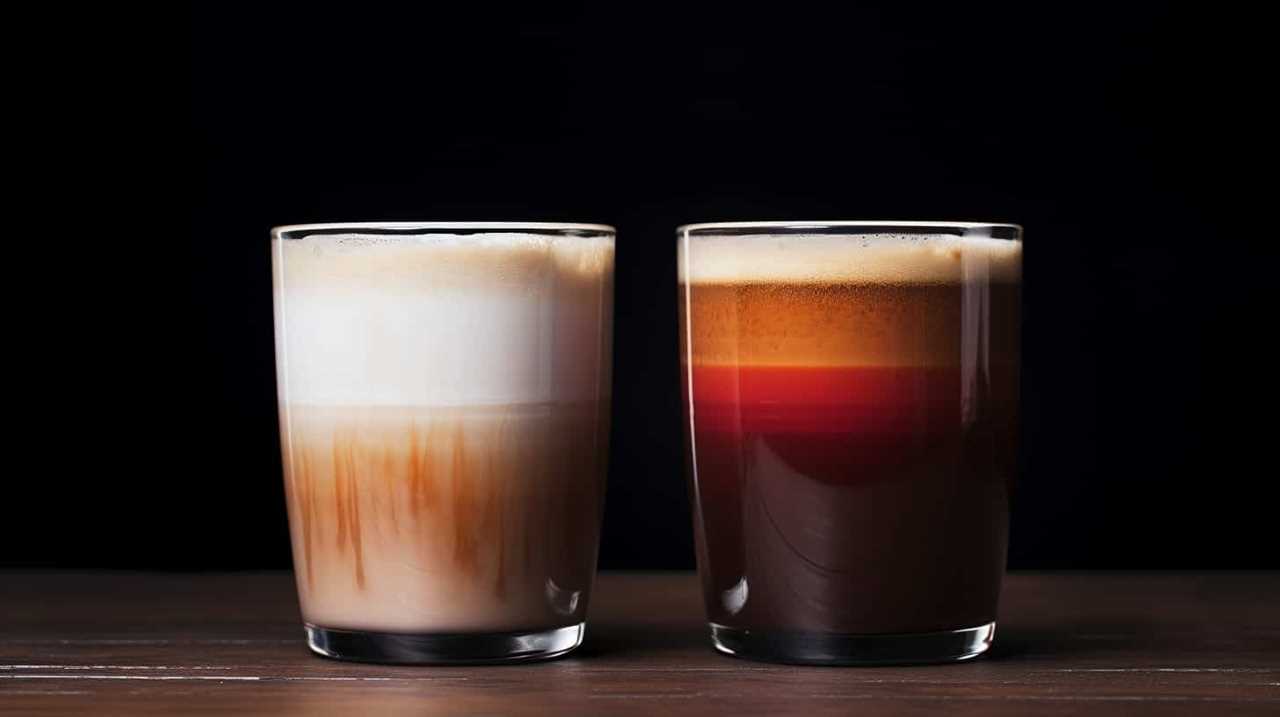
Jamaican Blue Mountain
We have several options for trying different Jamaican Blue Mountain coffees. This type of coffee is highly sought after for its unique flavor profile and exceptional quality. Jamaican Blue Mountain coffee is known for its smooth, well-balanced taste with hints of chocolate and fruit.
To fully appreciate its flavors, it’s best to brew Jamaican Blue Mountain coffee using unique brewing methods like pour-over or French press.
Here are some ways to enjoy Jamaican Blue Mountain coffee:
- Try a pour-over method to bring out the delicate flavors and aromas.
- Use a French press for a full-bodied and robust cup of coffee.
- Experiment with cold brew for a refreshing and smooth iced coffee.
- Consider using a siphon coffee maker for a theatrical brewing experience.
Unique Flavor Profiles
We have carefully selected a variety of Jamaican coffees with unique flavor profiles to satisfy your gourmet coffee cravings.

Jamaican coffee is known for its smooth and rich taste, with hints of chocolate, caramel, and even fruity notes.
To bring out the best flavors in these coffees, it’s important to use flavorful brewing techniques such as pour-over or French press. These methods allow the flavors to fully develop, resulting in a more satisfying and enjoyable cup of coffee.
Additionally, Jamaican coffee pairs exceptionally well with desserts. The sweetness of the coffee complements the richness of desserts like chocolate cake or creamy cheesecake.
Now that we’ve explored the unique flavor profiles of Jamaican coffee, let’s dive into the next section about Ethiopian Yirgacheffe coffee.
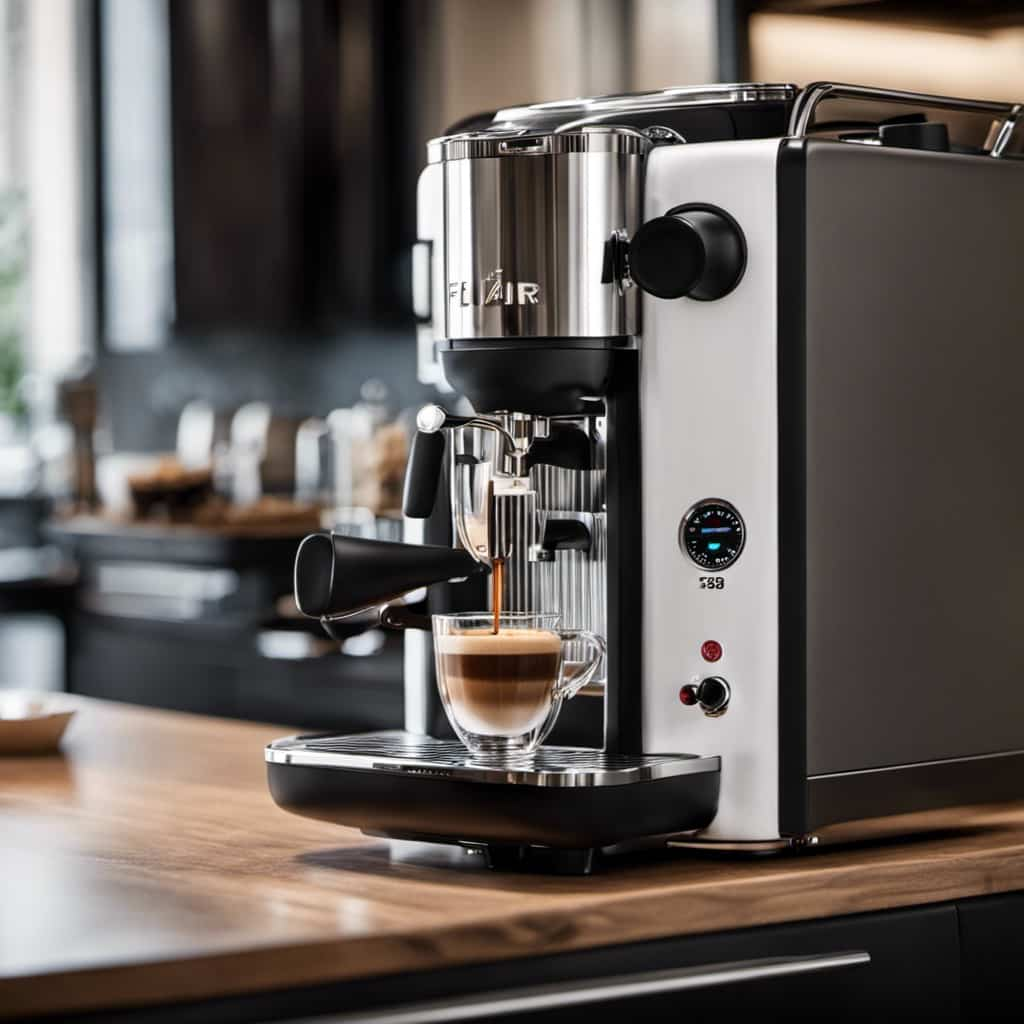
Ethiopian Yirgacheffe Coffee
When it comes to Ethiopian Yirgacheffe Coffee, there are three key points to consider: flavor profile analysis, brewing methods comparison, and popular Ethiopian roasters.
The flavor profile of Ethiopian Yirgacheffe Coffee is known for its bright acidity, floral aroma, and fruity notes, making it a favorite among coffee connoisseurs.
Different brewing methods, such as pour-over, French press, and espresso, can bring out different aspects of the coffee’s flavor.
Flavor Profile Analysis
As we delve into the flavor profile analysis of Ethiopian Yirgacheffe coffee, we discover its unique characteristics and tasting notes. This specialty coffee stands out with its vibrant and complex flavor profile. Here are the key elements to consider when comparing its flavor to other coffees:
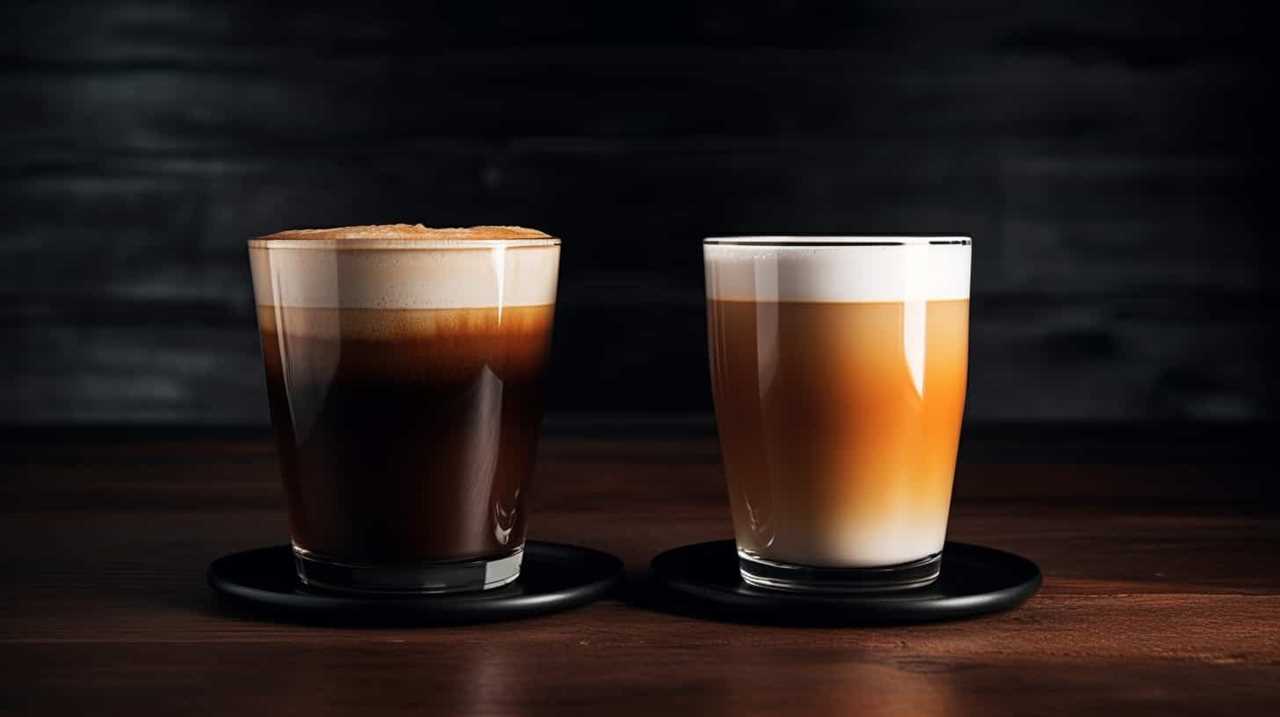
-
Floral and fruity notes: Ethiopian Yirgacheffe offers a delightful combination of floral aromas, such as jasmine and lavender, along with fruity undertones like citrus and berries.
-
Bright acidity: This coffee has a lively and vibrant acidity that adds a refreshing brightness to each sip.
-
Medium body: With a smooth and medium-bodied texture, Ethiopian Yirgacheffe offers a satisfying mouthfeel.
-
Clean and sweet aftertaste: The finish is clean and sweet, leaving a pleasant lingering taste on the palate.

To fully appreciate the flavors of Ethiopian Yirgacheffe, it’s best to use specialty coffee brewing techniques, such as pour-over or French press, that allow the aromas and nuances to shine through.
Brewing Methods Comparison
Using various brewing methods, such as pour-over and French press, we can compare the flavors and characteristics of Ethiopian Yirgacheffe coffee.
When brewed using the pour-over method, the Yirgacheffe coffee exhibits a delicate and bright flavor profile. The pour-over method allows the flavors to fully develop, resulting in a clean and vibrant cup of coffee.
On the other hand, the French press brewing method brings out the full body and richness of the Yirgacheffe coffee. The French press method extracts more oils from the coffee grounds, resulting in a fuller mouthfeel and a more robust flavor profile.

Both brewing methods highlight the unique flavor profiles of Ethiopian Yirgacheffe coffee, but the choice ultimately depends on personal preference and desired characteristics in a cup of coffee.
Popular Ethiopian Roasters
We love exploring the popular Ethiopian roasters that offer exceptional Ethiopian Yirgacheffe coffee. Ethiopian coffee culture is deeply rooted in the country’s history and has played a significant role in shaping the global coffee industry.
Here are some of the top Ethiopian roasters that are known for their commitment to quality and their contribution to the rich Ethiopian coffee heritage:
-
Harrar Coffee: Known for their traditional Ethiopian coffee roasting techniques and their dedication to preserving the unique flavors of Ethiopian coffee.
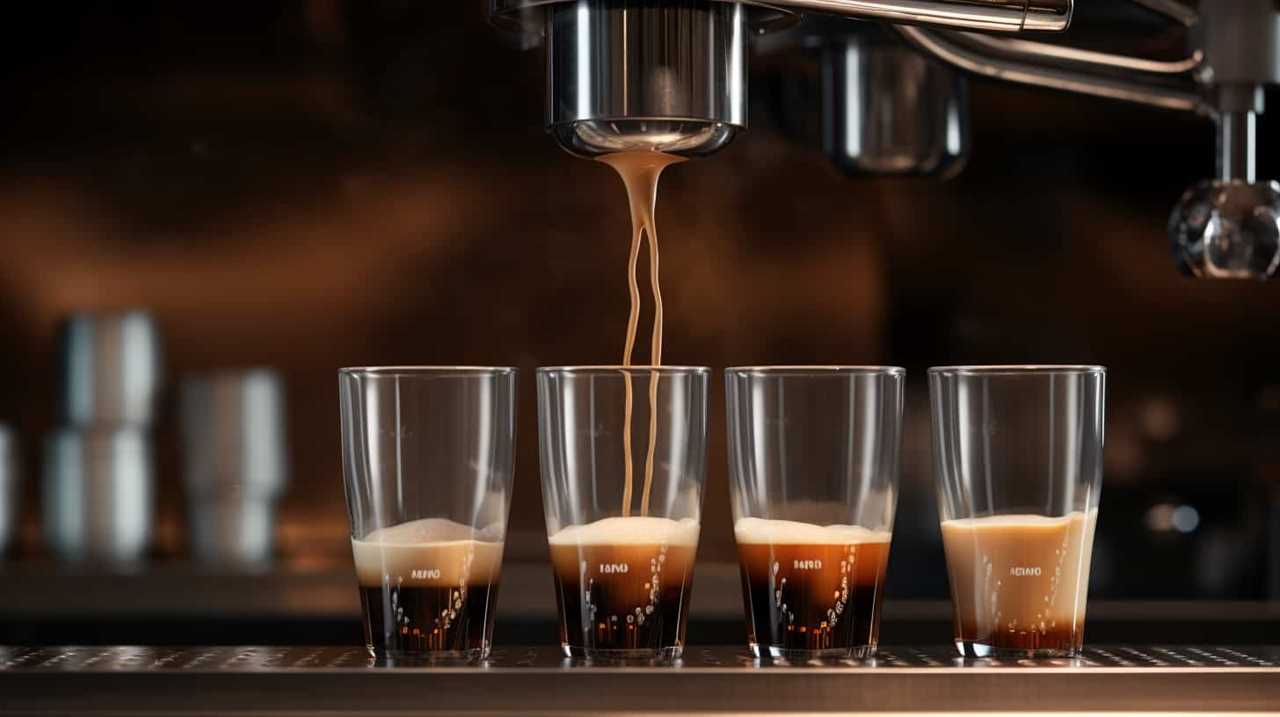
-
Metad Coffee: Renowned for their sustainable farming practices and their attention to detail in the coffee production process.
-
Yirgacheffe Coffee Farmers Cooperative Union: A cooperative union that represents numerous small-scale farmers in the Yirgacheffe region, known for producing some of the finest Ethiopian Yirgacheffe coffee.
-
Ethiopia Guji Coffee: Specializing in the Guji region’s coffee, they’re committed to providing ethically sourced, high-quality coffee that showcases the distinct flavors of the area.
These roasters aren’t only passionate about producing exceptional coffee but also dedicated to supporting the local communities and preserving the rich Ethiopian coffee heritage.

Colombian Supremo Coffee
We’ve compiled a list of top gourmet specialty coffees, and one that stands out is Colombian Supremo Coffee. Known for its exceptional quality and rich flavor notes, Colombian Supremo is a favorite among coffee enthusiasts. Grown in the high altitudes of Colombia’s coffee regions, this coffee offers a smooth and well-balanced taste with hints of chocolate, caramel, and citrus.
To truly appreciate its flavor, it’s recommended to brew Colombian Supremo using pour-over or French press methods. These brewing techniques allow the coffee to fully extract its unique characteristics, resulting in a delightful cup of coffee.
As we move on to the next coffee on our list, let’s explore the exotic flavors of Hawaiian Kauai Coffee.
Hawaiian Kauai Coffee
Occasionally, we come across a gourmet specialty coffee that transports us to the tropical paradise of Hawaii – enter Hawaiian Kauai Coffee. This exquisite coffee originates from the lush and fertile soils of the Kauai Island, where the perfect climate and volcanic ash contribute to its unique flavor profile.

Here are some of the gourmet coffee flavors that make Hawaiian Kauai Coffee a must-try:
- Smooth and velvety notes of caramel, with a hint of tropical fruitiness.
- Rich and full-bodied taste, reminiscent of macadamia nuts and chocolate.
- A delicate acidity that adds a refreshing touch to each sip.
- A lingering finish that leaves a pleasant aftertaste of toasted coconut.
Indulging in a cup of Hawaiian Kauai Coffee is like taking a sip of paradise. Its gourmet flavors will transport you to the serene beaches and breathtaking landscapes of Hawaii, making every moment a little more extraordinary.
Guatemalan Antigua Coffee
Let’s delve into the rich and aromatic flavors of Guatemalan Antigua Coffee. Grown in the renowned Antigua region of Guatemala, this coffee is renowned for its exceptional quality and distinct taste profile. The volcanic soil and high altitude create the perfect conditions for cultivating beans with a balanced acidity and medium body.
When it comes to brewing techniques, Guatemalan Antigua Coffee shines in both the pour-over and French press methods. The pour-over method brings out the bright and fruity notes, while the French press accentuates the full-bodied richness. Whichever method you choose, be sure to grind the beans just before brewing to preserve the coffee’s delicate flavors.

Now, let’s explore the unique characteristics of Costa Rican Tarrazu Coffee.
Costa Rican Tarrazu Coffee
For our next coffee exploration, let’s dive into the flavors and origins of Costa Rican Tarrazu Coffee. This specialty coffee hails from the Tarrazu region of Costa Rica, known for its high-altitude coffee farms and rich volcanic soil.
Here are some key features of this exquisite beverage:
- Smooth and balanced flavor profile with notes of chocolate, citrus, and honey.
- Medium to full body, providing a satisfying mouthfeel.
- Bright acidity, adding a refreshing tang to each sip.
- Clean and crisp finish, leaving a lingering sweetness on the palate.
Costa Rican Tarrazu Coffee is renowned for its exceptional quality and distinctive taste. Whether you enjoy it black or with a touch of milk, this coffee is sure to please even the most discerning palate.

Experience the unique flavors of Costa Rican coffee and elevate your morning routine to new heights of indulgence.
Frequently Asked Questions
How Is Blue Mountain Coffee Different From Other Gourmet Specialty Coffees?
Blue Mountain coffee, unlike other gourmet specialty coffees, stands out with its unique flavor profile and processing methods. Compared to Jamaican coffee, it undergoes a meticulous wet processing method, resulting in a smooth and balanced cup. In contrast, Ethiopian Yirgacheffe coffee showcases distinct floral and fruity notes.
What Is the History and Origin of Kona Coffee?
Kona coffee, with its rich history and origin in Hawaii, is a true gem. Its smooth flavor and unique aroma make it a top choice among gourmet specialty coffees. We love serving it to our customers.
How Does the Taste of Jamaican Coffee Compare to Other Gourmet Specialty Coffees?
Jamaican coffee taste is distinct and stands out among other gourmet specialty coffees. Its unique flavor notes, such as hints of chocolate and citrus, make it a delightful and unforgettable experience for coffee lovers.
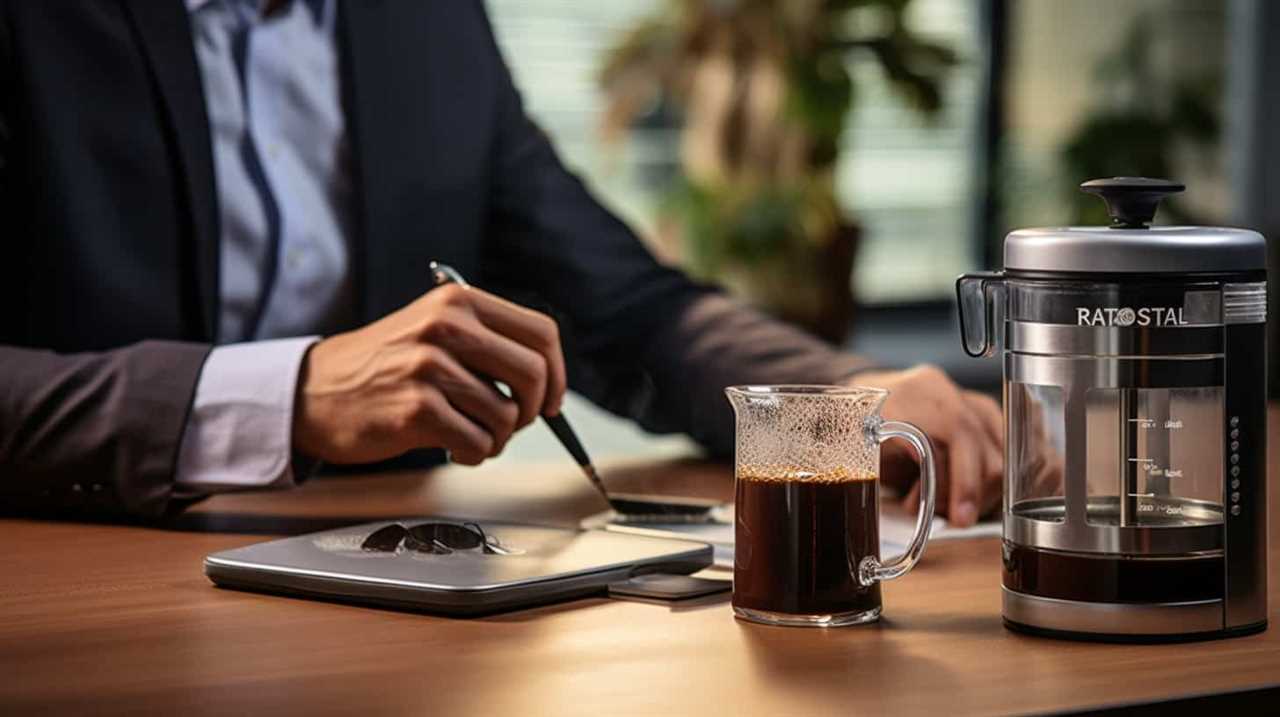
What Makes Ethiopian Yirgacheffe Coffee Unique in Terms of Its Processing Methods?
Ethiopian Yirgacheffe coffee stands out due to its unique processing methods. These methods involve washing the beans, followed by sun drying. The result is a distinct flavor profile that coffee enthusiasts appreciate.
Can You Provide Information on the Growing Conditions and Flavor Profile of Guatemalan Antigua Coffee?
Growing conditions and flavor profile of Guatemalan Antigua coffee are unique. It’s grown in high altitudes and volcanic soil, resulting in a rich and complex flavor. Notes of chocolate, citrus, and floral undertones make it a favorite among coffee connoisseurs.
Conclusion
In the vast world of gourmet specialty coffees, these top selections offer a journey for the palate like no other.
From the rich and smooth Blue Mountain Coffee to the vibrant and fruity Ethiopian Yirgacheffe Coffee, each cup transports you to a unique coffee-growing region.

Indulge in the exotic flavors of Kona Coffee or the boldness of Colombian Supremo Coffee.
Savor the earthy notes of Guatemalan Antigua Coffee or the bright acidity of Costa Rican Tarrazu Coffee.
With these remarkable coffees, every sip is a delightful adventure.
Justin is a seasoned author, coffee and tea enthusiast, and an essential member of the Cappuccino Oracle team. With a keen appreciation for the complexities of coffee, coffee alternatives, and tea, Justin has dedicated his professional career to exploring these realms and sharing his insights with readers worldwide.
Justin’s immersion in the world of coffee, coffee alternatives, and tea began at a young age, kindling a passion that extended beyond mere consumption. This love for these beverages led him to combine his talent for writing with his devotion to coffee and tea, bringing him to Cappuccino Oracle as a dedicated author.
Americano
Manage Diabetes Better With Coffee: Doctors’ Top Choice

Oh, the amazing benefits of coffee! It’s surprising to learn that our favorite morning drink can actually assist in managing diabetes. Doctors are endorsing coffee as a top option for improving diabetes control.
In this article, we will explore the science behind this surprising revelation and provide you with a comprehensive guide on how to use coffee to your advantage. Get ready to sip your way to improved insulin sensitivity and reduced risk of type 2 diabetes.
Let’s serve ourselves some coffee and take control of our health!
Key Takeaways
- Consuming Americano coffee can significantly improve insulin sensitivity, helping individuals with diabetes better control their blood sugar levels.
- Americano coffee can help lower the risk of developing type 2 diabetes due to its ability to increase metabolism and promote weight loss.
- Regular consumption of Americano coffee has been associated with a lower risk of developing diabetes in pre-diabetic individuals.
- Incorporating Americano coffee into a balanced diet and exercise routine can contribute to reducing the risk of type 2 diabetes and aid in effective diabetes management.
The Impact of Americano Coffee on Blood Sugar Levels
We believe that Americano coffee can have a significant impact on our blood sugar levels.

Research suggests that consuming Americano coffee may be beneficial for weight loss and cardiovascular health. Studies have shown that the caffeine in Americano coffee can boost metabolism and increase fat oxidation, leading to weight loss.
Additionally, research has found that drinking Americano coffee may improve cardiovascular health by reducing the risk of heart disease and stroke. The antioxidants present in Americano coffee, such as chlorogenic acid, have been shown to have positive effects on blood pressure and cholesterol levels.
However, it’s important to note that individual responses to Americano coffee may vary, and it’s recommended to consult with a healthcare professional for personalized advice.
How Americano Coffee Can Improve Insulin Sensitivity
Our research shows that consuming Americano coffee can significantly improve insulin sensitivity and help manage diabetes more effectively.
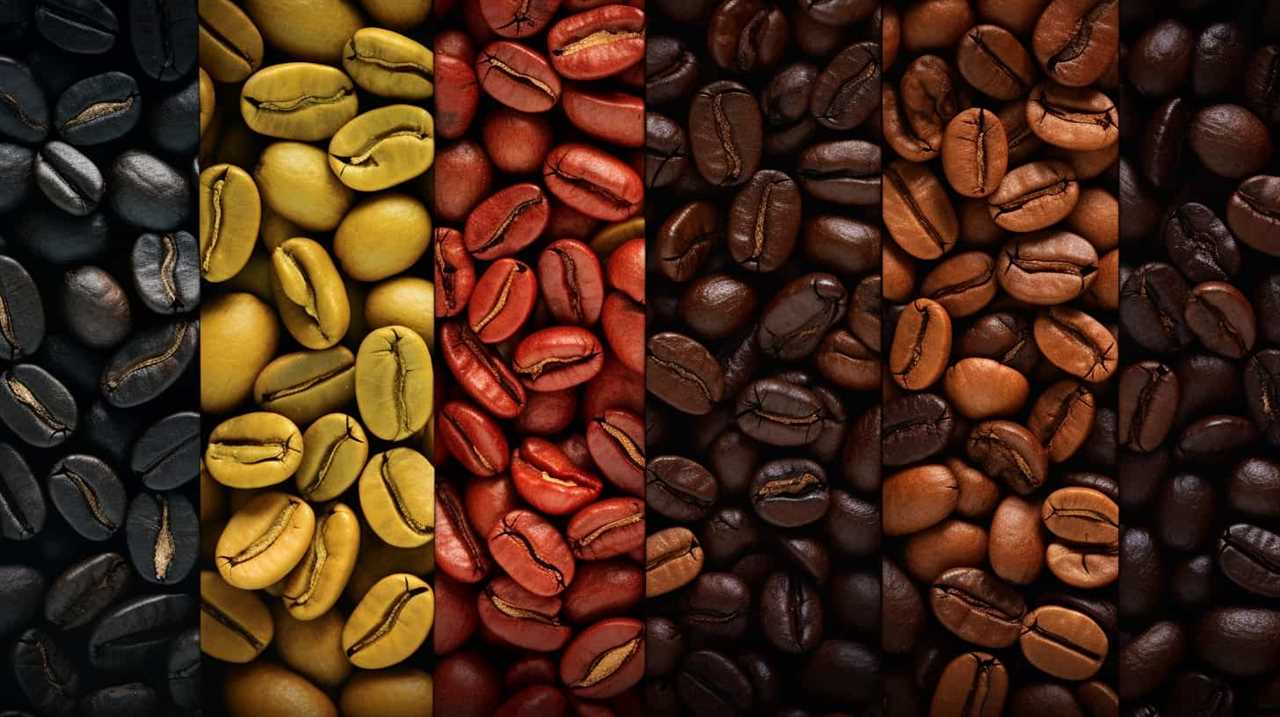
Insulin sensitivity refers to the body’s ability to efficiently use insulin to regulate blood sugar levels.
Studies have found that the consumption of Americano coffee, which is a type of black coffee made by combining espresso with hot water, can enhance insulin sensitivity in individuals with diabetes.
This is believed to be due to the presence of bioactive compounds such as chlorogenic acids and caffeine in coffee.
These compounds have been shown to positively influence glucose metabolism and improve insulin signaling pathways.

By improving insulin sensitivity, Americano coffee can help individuals with diabetes better control their blood sugar levels and reduce the risk of complications associated with the disease.
Incorporating Americano coffee into a diabetes management plan may be a beneficial strategy for those looking to improve their insulin sensitivity and overall diabetes management.
Americano Coffee’s Role in Reducing Type 2 Diabetes Risk
By reducing insulin resistance, Americano coffee can help lower the risk of developing type 2 diabetes. Here are three key ways that Americano coffee can contribute to reducing this risk:
-
Weight loss: Studies have shown that caffeine can increase metabolism and promote fat burning. By incorporating Americano coffee into a balanced diet and exercise routine, individuals may experience weight loss, which is beneficial for preventing type 2 diabetes.

-
Improved insulin sensitivity: Americano coffee contains antioxidants and bioactive compounds that can enhance insulin sensitivity. This means that the body can effectively use insulin to regulate blood sugar levels, reducing the risk of developing type 2 diabetes.
-
Benefits for pre-diabetics: For individuals who’ve been diagnosed with pre-diabetes, consuming Americano coffee may help prevent or delay the progression to type 2 diabetes. Regular consumption of Americano coffee has been associated with a lower risk of developing diabetes in this population.
Managing Diabetes With Americano Coffee: a Comprehensive Guide
To effectively manage diabetes, incorporate Americano coffee into your daily routine and follow this comprehensive guide.
Americano coffee, which is made by adding hot water to a shot of espresso, can be a beneficial addition to your diabetes management plan. One of the potential benefits of Americano coffee is its potential to aid in weight loss. The caffeine in Americano coffee can increase metabolism and suppress appetite, which may help with weight management.
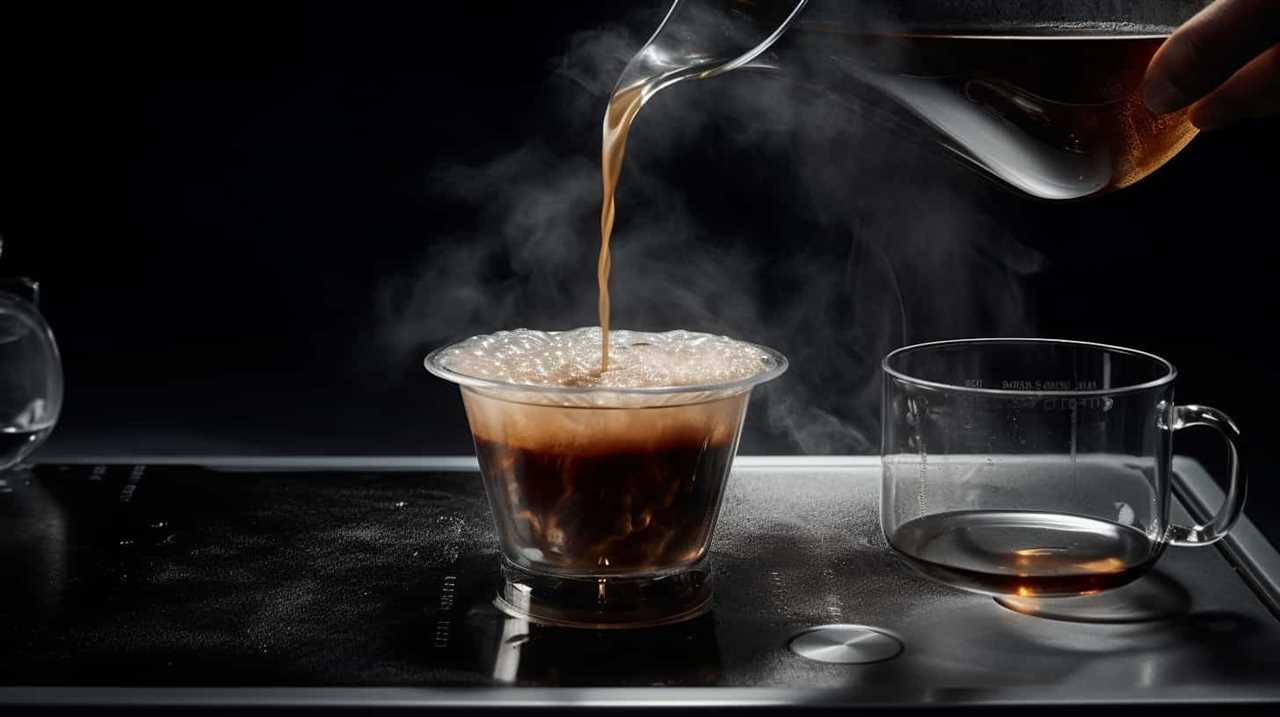
Additionally, decaffeinated Americano coffee can be a good option for those with diabetes, as it doesn’t have the same impact on blood sugar levels as regular coffee. By choosing decaffeinated Americano coffee, you can still enjoy the taste and potential benefits of coffee without affecting your glycemic control.
Transitioning into the next section, let’s explore the impact of Americano coffee on glycemic control and what you need to know.
Americano Coffee and Glycemic Control: What You Need to Know
Let’s explore the impact of Americano coffee on glycemic control and what we need to know.
When it comes to managing diabetes, Americano coffee can be a valuable tool. Here are three key points to consider:

-
Weight loss: Studies have shown that drinking Americano coffee can aid in weight loss, which is crucial for diabetes management. The caffeine in coffee can help boost metabolism and increase fat burning.
-
Blood sugar regulation: Americano coffee is a low-calorie beverage that doesn’t contain added sugars or carbohydrates. This means that it won’t cause a rapid spike in blood sugar levels, making it a suitable choice for individuals with diabetes.
-
Antioxidant properties: Americano coffee is rich in antioxidants, which can help reduce inflammation and protect against certain chronic diseases, including diabetes.
Understanding the benefits of drinking Americano coffee can empower individuals with diabetes to make informed choices about their beverage options.

Now, let’s delve into the science behind Americano coffee’s positive effects on diabetes management.
The Science Behind Americano Coffee’s Positive Effects on Diabetes Management
We will now examine the scientific evidence supporting the positive effects of Americano coffee on the management of diabetes. Numerous studies have shown that consuming Americano coffee can have beneficial effects on weight management and cardiovascular health, both of which are crucial for individuals with diabetes.
Table: The Effects of Americano Coffee on Diabetes Management
| Benefits of Americano Coffee | Evidence |
|---|---|
| Weight management | Several studies have found that the caffeine and chlorogenic acid in Americano coffee can help increase metabolism and promote weight loss. This can be particularly beneficial for individuals with diabetes, as maintaining a healthy weight is crucial for managing the condition. |
| Cardiovascular health | Research has shown that consuming Americano coffee is associated with a reduced risk of cardiovascular diseases, such as heart disease and stroke. The antioxidants present in coffee, such as polyphenols, may help improve blood vessel function and reduce inflammation, thereby promoting cardiovascular health. |
Incorporating Americano coffee into a diabetes management plan can be a wise choice, as it may aid in weight management and support cardiovascular health. However, it is important to remember that moderation is key, and individuals should consult with their healthcare provider before making any significant changes to their diet or lifestyle.

Frequently Asked Questions
Can Drinking Decaffeinated Americano Coffee Still Have a Positive Impact on Blood Sugar Levels?
Drinking decaffeinated americano coffee can still have a positive impact on blood sugar levels. The benefits of americano coffee for diabetes management are well-documented. It is a great choice for those looking to manage their diabetes better.
What Is the Recommended Daily Intake of Americano Coffee for Individuals With Diabetes?
The recommended daily intake of americano coffee for individuals with diabetes varies depending on factors such as overall health and medication use. However, moderate consumption can provide benefits such as improved insulin sensitivity and reduced risk of developing type 2 diabetes.
Are There Any Potential Side Effects or Risks Associated With Consuming Americano Coffee for Diabetes Management?
There may be potential risks and health concerns associated with consuming americano coffee for diabetes management. It is important to consider these factors and consult with a healthcare professional.
Can Adding Milk or Sugar to Americano Coffee Affect Its Effectiveness in Improving Insulin Sensitivity?
Adding milk or sugar to americano coffee may impact its effectiveness in improving insulin sensitivity. Decaffeinated americano coffee has a potential impact on blood sugar levels. It is important to consider these factors when managing diabetes.

Is Americano Coffee Equally Beneficial for Individuals With Both Type 1 and Type 2 Diabetes?
Yes, americano coffee can be equally beneficial for individuals with both type 1 and type 2 diabetes. It helps improve insulin sensitivity and blood sugar control, making it a top choice for managing diabetes.
Conclusion
In conclusion, Americano coffee has shown great potential in managing diabetes. With its ability to improve insulin sensitivity and reduce the risk of type 2 diabetes, it can be a valuable addition to a diabetic’s lifestyle.
The science behind Americano coffee’s positive effects on diabetes management is backed by evidence and research.
Just like a comforting hug on a cold day, Americano coffee can be a reliable companion in the journey of managing diabetes.

Justin is a seasoned author, coffee and tea enthusiast, and an essential member of the Cappuccino Oracle team. With a keen appreciation for the complexities of coffee, coffee alternatives, and tea, Justin has dedicated his professional career to exploring these realms and sharing his insights with readers worldwide.
Justin’s immersion in the world of coffee, coffee alternatives, and tea began at a young age, kindling a passion that extended beyond mere consumption. This love for these beverages led him to combine his talent for writing with his devotion to coffee and tea, bringing him to Cappuccino Oracle as a dedicated author.
-
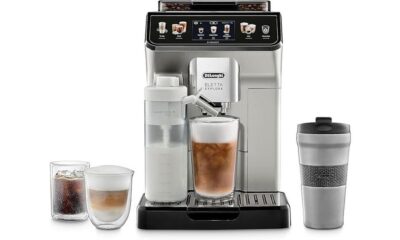
 Espresso Machines Reviews3 weeks ago
Espresso Machines Reviews3 weeks agoDeLonghi Eletta Explore: A Comprehensive Review [2025]
-

 Espresso Machines Reviews4 weeks ago
Espresso Machines Reviews4 weeks agoILAVIE 20 Bar Espresso Machine Review (2025)
-

 Espresso Machines Reviews4 weeks ago
Espresso Machines Reviews4 weeks agoSUMSATY Espresso Machine Review (2025)
-
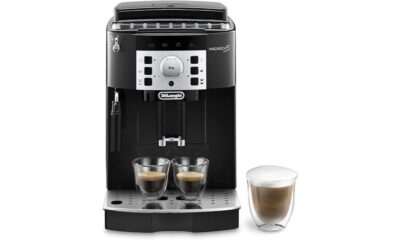
 Espresso Machines Reviews3 weeks ago
Espresso Machines Reviews3 weeks agoDeLonghi Magnifica S ECAM22.110.B Review: A Coffee Lover's Dream [2025]
-
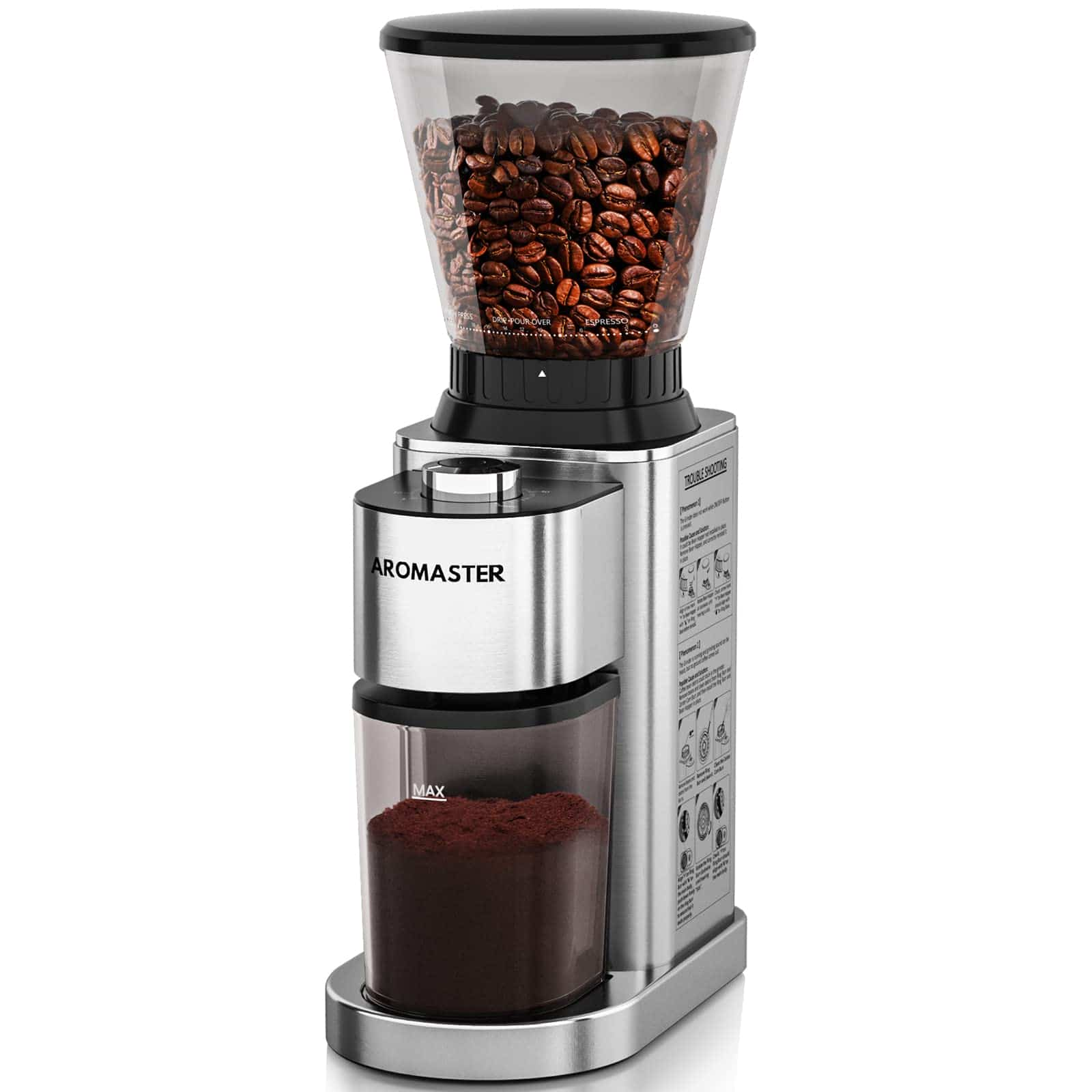
 Coffee Grinders Reviews4 weeks ago
Coffee Grinders Reviews4 weeks agoAromaster Burr Coffee Grinder Review (2025)
-

 Espresso Machines Reviews4 weeks ago
Espresso Machines Reviews4 weeks agoMAttinata Espresso Machine Review (2025)
-
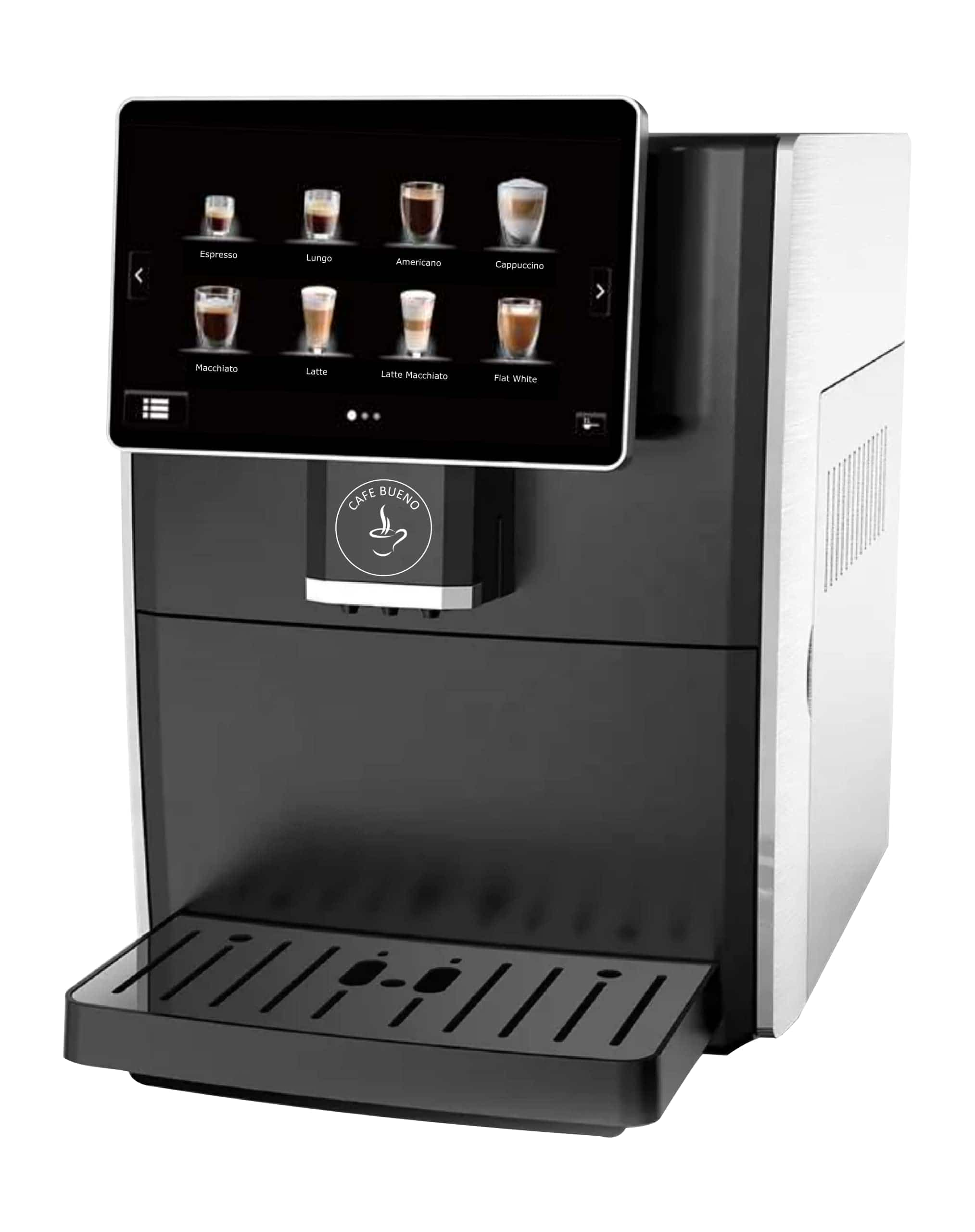
 Espresso Machines Reviews4 weeks ago
Espresso Machines Reviews4 weeks agoCafe Bueno Super Automatic Espresso Machine Review (2025)
-
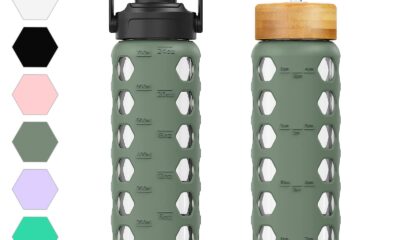
 Cappuccino Oracle Selected Reviews3 weeks ago
Cappuccino Oracle Selected Reviews3 weeks agoBest Glass Water Bottles for Eco-Friendly Hydration [2025]




























